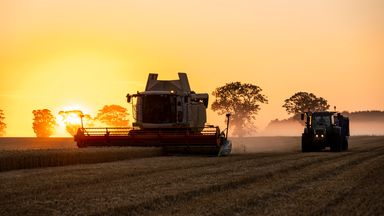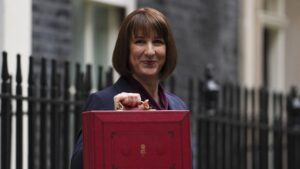Food prices could rise due to Rachel Reeves’s farm inheritance tax change in budget, farmers warn
The chancellor announced families inheriting farms will now have to pay inheritance tax on anything over £1m, which farmers say does not get you much.

Rachel Reeves’ changes to agricultural inheritance tax could lead to food price rises and will have a “catastrophic” impact on family farms, farmers have warned.
The chancellor announced in Wednesday’s budget inheritance tax of 50%, at an effective rate of 20%, will be imposed on farms worth over £1m, where previously they were exempt.
Her announcement has been met with anger from rural communities, with celebrities such as Jeremy Clarkson saying farmers “have been shafted”, and Kirstie Allsopp saying the chancellor has “destroyed the ability [for farmers] to pass farms on to their children”.
Politics latest: Labour playing ‘silly games’, says IFS
Farmers and the Conservative shadow farming minister have told Sky News the plan, which is due to begin in April 2026, risks pushing up food prices due to uncertainty and the possibility of farms having to be sold up so less food is produced.
National Farmers’ Union (NFU) president Tom Bradshaw said the policy “will snatch away” the next generation’s ability to produce British food.
Fourth generation Warwickshire farmer Bizza Walters, 26, told Sky News she would be forced to sell some of her family farm’s 500 acres to pay the £7,500 a month she has estimated she would have to pay for 10 years if her father and uncles, who own the farm, died.
“Our margins and costs are so tight and anything we make is reinvested, so I’d have to sell land which would not go back into food production,” she said.
“They’re going to have to come to their senses because food prices will go up because we won’t be able to produce as much food.”
Country Land and Business Association (CLA) president Victoria Vyvyan told Sky News the government has “conflated a business asset with personal wealth” in their bid to tax the wealthy.
But she said farms are businesses and most run on tight margins with little spare cash.
She added a £1m farm would only be about 100 acres in most UK areas, “which is not a viable business proposition”.
The £1m cap could also rack up quite quickly as it is not just the value of land, but also livestock, farmhouses, sheds and machinery.
Listen: Is the farmers’ inheritance tax the new pasty tax?
Conservative shadow farming minister Robbie Moore, who is from a farming background, said the move is “catastrophic for family farms”.
“This is effectively thievery, putting two fingers up to the farming industry,” he told Sky News as he accused the government of failing to understand how farming works.
“They’ve completely underestimated the effect this will have, it creates a lot of uncertainty in terms of how that land will be managed.
Be the first to get Breaking News
Install the Sky News app for free


“If you want to invest in that holding to produce food, you need certainty, and what the announcement creates is uncertainty.
“It will have a direct impact on the food security agenda and food prices further down the line.
“If you’re wanting to work hard to hand farmland down to the next generation, you’re completely disincentivised to do that.”
He reiterated what lots of farmers have been saying: that their land may be high in value, but they are struggling with cashflows, so paying tax to continue the family business may not be viable for many.
NFU president Mr Bradshaw added: “This budget not only threatens family farms but will also make producing food more expensive.
“This means more cost for farmers who simply cannot absorb it, and it will have to be borne by someone.
“Farmers are down to the bone and gristle, who is going to carry these costs?”
The government says it is still committed to supporting farmers and “the vital role they play to feed our nation”.
Speaking on Thursday, the chancellor described the changes as “fair and proportionate”.
“We needed to raise money in the budget yesterday, and we know that there are a lot of landowners who are very wealthy, some who buy land to avoid paying inheritance tax because previously there was no inheritance tax,” she said.
The Department for Environment, Food and Rural Affairs (DEFRA) has been contacted for comment.


